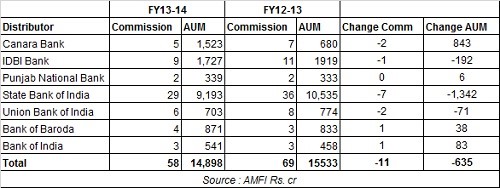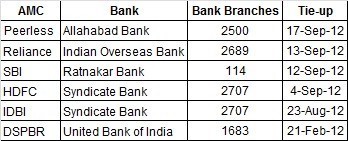 SEBI, in its long term policy for mutual funds, had asked AMCs to
distribute their products through public sector banks to reach out to
hinterland.
SEBI, in its long term policy for mutual funds, had asked AMCs to
distribute their products through public sector banks to reach out to
hinterland.
However, most public sector banks are yet to take up mutual fund distribution seriously. In fact, the commissions earned by majority of PSU banks through mutual funds have dropped. In FY12-13, seven public sector banks earned Rs. 69 crore by selling mutual funds. In FY13-14, their revenues from mutual funds dropped by 16% from Rs. 69 crore to Rs. 58 crore. Their assets under advisory also dropped by Rs. 635 crore last year.
Public sector behemoth— SBI Bank which is the largest MF distributor in the PSU banks space saw its revenues from mutual fund distribution drop by Rs. 36 crore to Rs. 29 crore in FY13-14. IDBI Bank which is the second largest mutual fund distributor in PSU category too saw its commission earnings drop from Rs. 11 crore to Rs. 9 crore in FY13-14.
“These banks largely sell retail products like equity funds and gold funds through SIP route. They don’t have dedicated wealth management team who can advise on sophisticated products like capital protection funds, asset allocation funds and debt funds. Last year the industry has seen redemptions from equity and gold funds thus the commissions of these banks have dropped. Even fund houses tend to promote SIPs through PSU banks since majority of bank customers tend to be first time MF investors. Since the market has gone up now, they are starting to show interest,” said Sarath Sarma, Executive Director and Sales Head, IDBI Mutual Fund.
Long way to go

While majority of fund houses have tie ups with public sector banks for a long time now, recently they have also joined hands with regional or co-operative banks.

Compared to private banks that are more active in MF distribution in metros, PSU banks bring the reach in semi-urban and rural areas for AMCs. Most fund officials feel that PSU banks provide a huge potential in the times to come. Additionally, customers have a good connect with the branch officials of PSU banks.
AMCs have to provide a lot of handholding and support to PSU banks initially as they are not fully equipped to market MF schemes. AMCs provide training to the relationship managers of the banks they have tied-up with. The list of MF schemes which banks sell is usually researched by banks internally and in consultation with AMCs. Most banks have a separate division called third party products division which handles mutual fund sales.
Getting the right talent to distribute mutual funds has been a challenge for PSUs.
“The inflows from these banks are miniscule. Getting experienced people in third party distribution has been a challenge for PSU banks. They have to take it seriously,” said D P Singh, CMO, Domestic Markets, SBI Mutual Fund.
To attract distributors from hinterland, SEBI has allowed AMCs to charge a higher total expense ratio (TER), based on certain conditions, if they receive inflows from B-15 cities. The higher TER is used to offer higher commissions to distributors who bring applications from small cities. It remains to be seen if this incentive will spur PSU banks to take up mutual fund distribution more aggressively.




